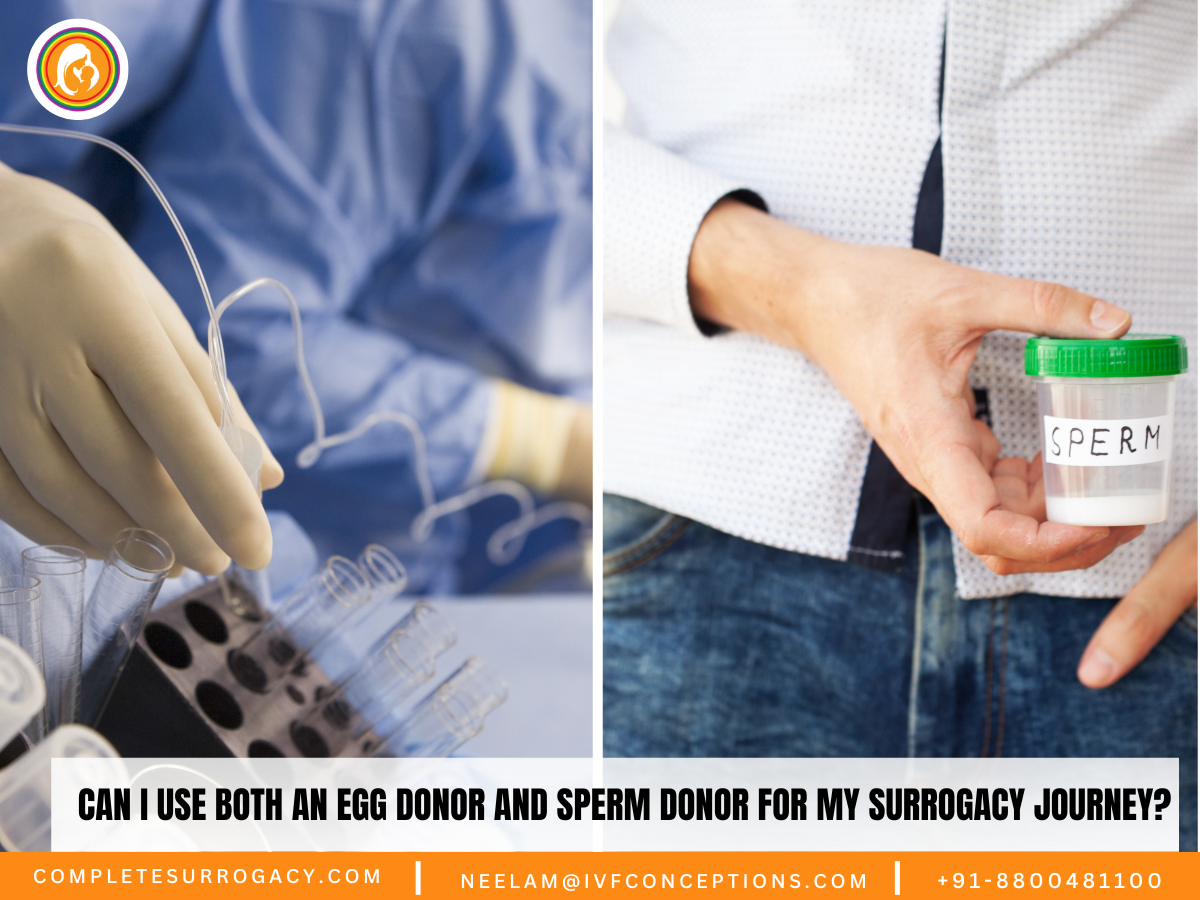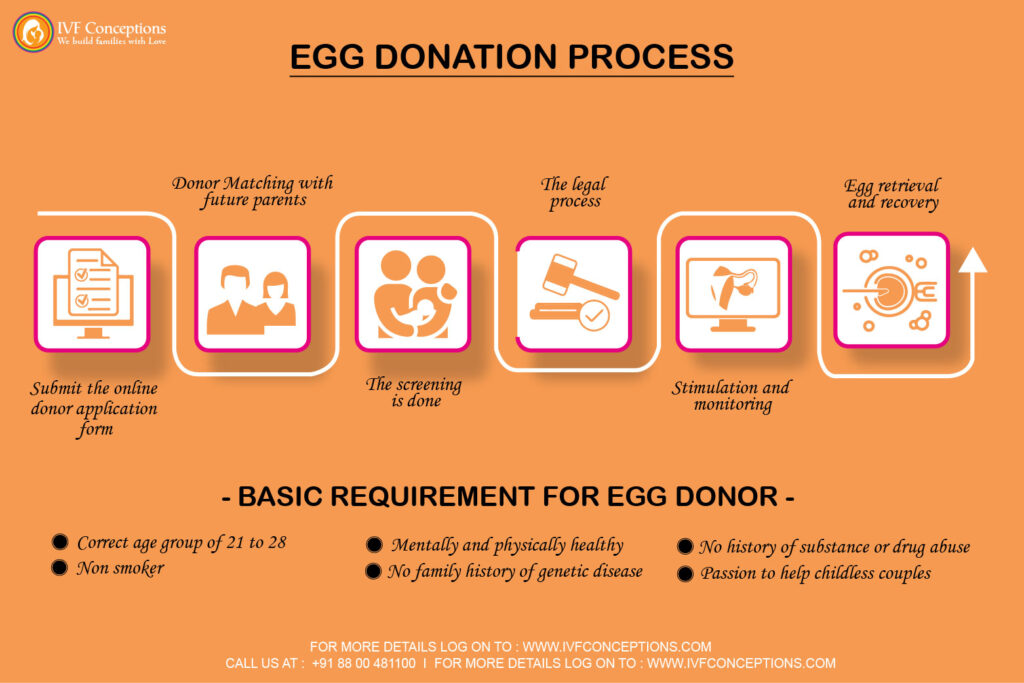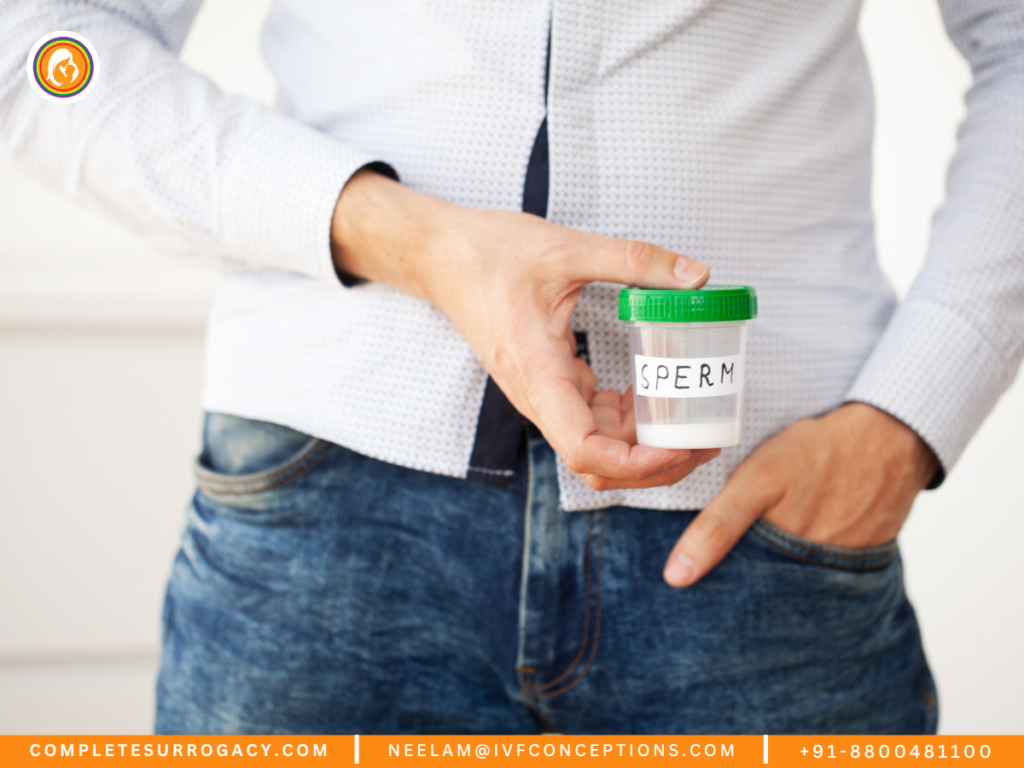Can I Use Both an Egg Donor and Sperm Donor for My Surrogacy Journey?

Yes, it is possible to use both an egg donor and a sperm donor in a surrogacy journey. This approach is often necessary for intended parents who, due to medical conditions or advanced age, cannot use their gametes. However, it’s important to understand that most surrogacy programs involve at least one genetic link between the intended parents and the child.
- Book an online appointment: Get a free online consultation.
- Call\W:+91-8800481100 Email:neelam@ivfconceptions.com
If you’re asking, “Can I Use Both an Egg Donor and Sperm Donor for My Surrogacy Journey?” the answer is yes, and this can be a suitable solution for individuals or couples who need to build their family without using their own biological material. Using egg and sperm donors in surrogacy opens up the possibility of parenthood for many who are otherwise unable to conceive. It’s essential to discuss your options with fertility specialists and surrogacy agencies to ensure you receive the best support for your needs.
This comprehensive guide explores how using egg and sperm donors can fit into a surrogacy plan, the implications of doing so, and the essential considerations for intended parents.
More Resources to Read:
Surrogacy Guide for Surrogate Mothers
Surrogacy Guide for Intended Parents
How does the surrogacy process work
Understanding Surrogacy
Surrogacy is a reproductive arrangement where a woman, known as a surrogate or gestational carrier, carries and gives birth to a child for another individual or couple. There are two main types of surrogacy:
| Type of Surrogacy | Description | Genetic Link |
| Gestational Surrogacy | Embryos are created through IVF using donor or intended parents’ gametes and transferred to the surrogate. | Child is genetically related to the intended parents (or one) but not the surrogate. |
| Traditional Surrogacy | The surrogate is inseminated with the intended father’s sperm. | Child is genetically related to the surrogate and the intended father. |
- Gestational Surrogacy: In this method, embryos are created through in vitro fertilization (IVF) using the eggs and sperm of the intended parents, or donor gametes if needed. These embryos are then transferred to the surrogate. In gestational surrogacy, the child is genetically related to the intended parents (or at least one of them) but not to the surrogate.
- Traditional Surrogacy: This involves the surrogate being artificially inseminated with the intended father’s sperm. Here, the child is genetically related to both the surrogate and the intended father. Traditional surrogacy is less common and not allowed in many countries due to its complex emotional and legal implications.
Surrogacy is a multifaceted process involving legal, emotional, and financial dimensions. Engaging with experienced professionals such as fertility doctors, surrogacy agencies, and attorneys is crucial to navigating this complex journey responsibly and ethically.
What is Egg Donation?
Egg donation is a procedure where a healthy woman donates her eggs to assist individuals or couples who cannot use their eggs due to infertility or other medical conditions. These eggs are fertilized through IVF, and the resulting embryos are implanted in the intended mother’s or surrogate’s uterus.
Egg donation is commonly used when:
- A woman has a diminished ovarian reserve or poor egg quality.
- The intended mother has medical conditions making pregnancy unsafe.
- Same-sex male couples wish to have children.
This process involves both medical and emotional considerations for the donor and intended parents. Working with specialized egg donor agencies and reproductive attorneys ensures that the process is managed ethically and legally.

Reasons Couples May Need an Egg Donor for IVF
- Ovarian Failure: Women who have gone through menopause or had their ovaries removed need donor eggs for IVF.
- Poor Egg Quality: Age, genetics, and medical conditions can impair egg quality, necessitating the use of donor eggs.
- Absence of Ovaries: Some women may be born without ovaries or have had them removed, requiring egg donation.
- Same-Sex Male Couples: These couples need donor eggs in combination with a surrogate for parenthood.
| Reasons for Egg Donation | Description |
| Ovarian Failure | Women who have gone through menopause or had their ovaries removed need donor eggs for IVF. |
| Poor Egg Quality | Age, genetics, and medical conditions can impair egg quality, necessitating the use of donor eggs. |
| Absence of Ovaries | Women born without ovaries or who had them removed require egg donation. |
| Same-Sex Male Couples | Need donor eggs combined with a surrogate to have children. |
What is Sperm Donation?
Sperm donation involves a man donating his sperm to help individuals or couples conceive. The sperm is used to fertilize an egg via IVF, and the resulting embryo is implanted in the uterus of the recipient or surrogate.
| Reasons for Sperm Donation | Description |
| Male Factor Infertility | Issues like low sperm count or poor sperm quality may necessitate the use of donor sperm. |
| Single Women | Some single women use donor sperm to conceive and raise a child independently. |
| Same-Sex Female Couples | Need donor sperm combined with assisted reproduction techniques to achieve pregnancy. |
Sperm donation is essential for:
- Couples with Male Factor Infertility: Issues like low sperm count or poor sperm quality.
- Single Women: Who wish to conceive and raise a child independently.
- Same-Sex Female Couples: Who need donor sperm for assisted reproduction.

Can International Surrogacy Be Done with Egg and Sperm Donors?
International surrogacy involves legal and logistical challenges, especially when using both egg and sperm donors. Laws vary widely across countries:
- Some Countries: Only allow surrogacy with a genetic link between the intended parents and the child.
- Others: Permit surrogacy regardless of genetic connection, but this can complicate citizenship and parental rights issues.
| Reasons for Egg Donation | Description |
| Ovarian Failure | Women who have gone through menopause or had their ovaries removed need donor eggs for IVF. |
| Poor Egg Quality | Age, genetics, and medical conditions can impair egg quality, necessitating the use of donor eggs. |
| Absence of Ovaries | Women born without ovaries or who had them removed require egg donation. |
| Same-Sex Male Couples | Need donor eggs combined with a surrogate to have children. |
In countries like the USA, DNA tests are required to establish genetic links for citizenship. In contrast, places like Colombia and Argentina offer pathways for citizenship through the surrogate mother. Researching and understanding the specific surrogacy regulations of both the host and intended parents‘ countries is crucial.
More Resources to Read:
Infertility Treatment and Surrogacy Process
9 Factors To Improve IVF Pregnancy Rate
International Surrogacy Options Worldwide
Surrogacy Guide for Surrogate Mothers
Conclusion
Choosing to use both an egg donor and a sperm donor in your surrogacy journey is a viable option, especially when no genetic material is available from the intended parents. It’s essential to work with knowledgeable professionals and carefully consider the legal, emotional, and financial aspects involved.
If you’d like to learn more about IVF, Egg Donation, or surrogacy services globally, check out the rest of our website at Complete Surrogacy Agency. We offer legally secure and affordable surrogacy consulting services for FREE.
Complete Surrogacy: Your Trusted Partner in International Surrogacy
At Complete Surrogacy, we have over 15 years of experience in international surrogacy, guiding 4,000+ intended parents worldwide. We provide safe, ethical, and affordable surrogacy solutions for single parents, LGBTQ+ couples, and heterosexual couples.
As members of EFS and ESHRE, we adhere to the highest ethical and professional standards. Our expert team is committed to providing accurate, compassionate, and transparent guidance, ensuring a legally secure and smooth journey to parenthood.
Let us help you build your family with trust, care, and integrity.
Get in touch for one FREE Surrogacy Consultancy!

FAQs for finding free surrogate mothers
1. Can I choose both egg and sperm donors for surrogacy?
Yes, you can choose both egg and sperm donors if needed. This is often done when intended parents cannot use their own gametes due to medical issues or age.
2. What are the legal considerations for using egg and sperm donors in surrogacy?
Legal considerations include ensuring that all parties involved understand their rights and responsibilities. It’s essential to work with legal professionals experienced in surrogacy and reproductive law to navigate these aspects.
3. Are there any countries where international surrogacy is easier with no genetic link?
Countries like Colombia and Argentina offer more flexibility regarding genetic links, making international surrogacy potentially easier in these locations. Always verify current regulations with legal experts.
4. What should I consider when choosing egg and sperm donors?
Consider factors such as the donor’s medical history, genetic screening, and psychological support. Ensure that all legal aspects are addressed, including contracts and rights.
5. How can I find reputable surrogacy agencies and fertility professionals?
Research agencies and professionals with positive reviews, proven experience, and a clear understanding of legal and ethical practices. Recommendations from previous clients and professional associations can also be helpful.

Author Bio: Neelam Chhagani is an International Surrogacy Expert with 15 years of experience in the fertility and surrogacy domain. As the founder of IVF Conceptions and Complete Surrogacy, she has guided over 4,000 intended parents worldwide on their surrogacy journey to parenthood. Recognized as a trusted authority, she specializes in holistic infertility solutions and third-party reproduction consulting.
Holding an MA in Counselling Psychology and a PGD in Mental Health, Neelam is a proud member of the European Fertility Society (EFS) and the European Society of Human Reproduction and Embryology (ESHRE). She is also a leading surrogacy blogger, providing valuable insights into ethical and practical surrogacy solutions.
Since 2010, committed to supporting ALL family types, Neelam has been passionate about helping intended parents grow their families with compassion, integrity, and a focus on secure and affordable surrogacy options Globally.
Learn more about Neelam:
https://www.ivfconceptions.com/neelam-chhagani-surrogacy-consultant/
https://www.linkedin.com/in/neelam-chhagani-92892229/















I was introduced to Neelam by a friend who worked with Neelam for surrogacy. Neelam is absolutely wonderful. I am a single male and the journey to fatherhood is not that easy. Neelam connected me to a program ideal for my circumstances. She was with me throughout the pregnancy providing advice and guidance along the way. I am so grateful I found her and am thrilled today that I have a beautiful daughter. I highly recommend Neelam to anyone who is on a journey to become a parent. Having a child has changed my world for the better. I wish others success with their own journey and recommend you connect with Neelam to find a path that is best for you.
SA (USA)